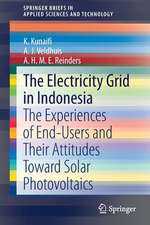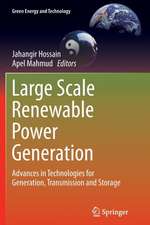Energy Transitions and Social Psychology: A Sociotechnical Perspective: Routledge Studies in Energy Transitions
Autor Paul Upham, Paula Bögel, Katinka Johansenen Limba Engleză Hardback – 21 feb 2019
Sociotechnical thinking is about the interactions of people and technology, including the rules, regulations and institutions involved. Such perspectives help to identify the many forms of path dependency that can make change difficult. Human behaviour plays a strong role in maintaining these path dependencies, but it can also introduce change. This book advocates a deliberately interdisciplinary research agenda that recognises the value of social psychological perspectives when seeking to create new pathways for energy supply and use. At the same time, it also demonstrates the value of sociotechnical perspectives for energy-related social psychology.
Energy Transitions and Social Psychology will be of great interest to students and scholars of energy transitions, environmental and energy psychology, sustainable development and innovation studies, as well as students and scholars of environment and energy more generally.
| Toate formatele și edițiile | Preț | Express |
|---|---|---|
| Paperback (1) | 272.50 lei 6-8 săpt. | |
| Taylor & Francis – 30 sep 2020 | 272.50 lei 6-8 săpt. | |
| Hardback (1) | 1000.27 lei 6-8 săpt. | |
| Taylor & Francis – 21 feb 2019 | 1000.27 lei 6-8 săpt. |
Preț: 1000.27 lei
Preț vechi: 1219.84 lei
-18% Nou
Puncte Express: 1500
Preț estimativ în valută:
191.40€ • 200.37$ • 158.37£
191.40€ • 200.37$ • 158.37£
Carte tipărită la comandă
Livrare economică 05-19 aprilie
Preluare comenzi: 021 569.72.76
Specificații
ISBN-13: 9781138311756
ISBN-10: 1138311758
Pagini: 210
Ilustrații: 15 Line drawings, black and white; 6 Tables, black and white; 15 Illustrations, black and white
Dimensiuni: 156 x 234 x 13 mm
Greutate: 0.45 kg
Ediția:1
Editura: Taylor & Francis
Colecția Routledge
Seria Routledge Studies in Energy Transitions
Locul publicării:Oxford, United Kingdom
ISBN-10: 1138311758
Pagini: 210
Ilustrații: 15 Line drawings, black and white; 6 Tables, black and white; 15 Illustrations, black and white
Dimensiuni: 156 x 234 x 13 mm
Greutate: 0.45 kg
Ediția:1
Editura: Taylor & Francis
Colecția Routledge
Seria Routledge Studies in Energy Transitions
Locul publicării:Oxford, United Kingdom
Cuprins
List of Figures
List of Tables
List of Boxes
Preface
Acknowledgements
Author Biographies
Part I Rationale
1. Introduction
2. Social science approaches to energy technology acceptance and diffusion
3. How is social psychology currently used in the sociotechnical sustainability transitions literature?
4. Strong structuration as an integrating framework for psychological and sociological perspectives
Part II Case study applications
5. The psychology of expectations in sociotechnical systems
6. The role of social representations in sociotechnical transitions
7. The role of values in grassroots innovations
8. Socio-technical transition governance and public engagement
9. Conclusions and research directions
Appendix
Index
List of Tables
List of Boxes
Preface
Acknowledgements
Author Biographies
Part I Rationale
1. Introduction
2. Social science approaches to energy technology acceptance and diffusion
3. How is social psychology currently used in the sociotechnical sustainability transitions literature?
4. Strong structuration as an integrating framework for psychological and sociological perspectives
Part II Case study applications
5. The psychology of expectations in sociotechnical systems
6. The role of social representations in sociotechnical transitions
7. The role of values in grassroots innovations
8. Socio-technical transition governance and public engagement
9. Conclusions and research directions
Appendix
Index
Notă biografică
Paul Upham is Chair of Human Behaviour and Sustainable Development at Leuphana University, Germany, and Visiting Professor at the Copernicus Institute of Sustainable Development at Utrecht University, the Netherlands.
Paula Bögel is a post-doctoral researcher in the social psychology of energy transitions at the Chair for Human Behaviour and Sustainable Development at Leuphana University, Germany and of the research group Urban Analytics and Transitions at the Royal Institute of Technology (KTH), Stockholm, Sweden.
Katinka Johansen is a post-doctoral researcher in energy social science at the Chair for Human Behaviour and Sustainable Development at Leuphana University, and has recently completed a PhD in social psychology at the Technical University of Denmark.
Paula Bögel is a post-doctoral researcher in the social psychology of energy transitions at the Chair for Human Behaviour and Sustainable Development at Leuphana University, Germany and of the research group Urban Analytics and Transitions at the Royal Institute of Technology (KTH), Stockholm, Sweden.
Katinka Johansen is a post-doctoral researcher in energy social science at the Chair for Human Behaviour and Sustainable Development at Leuphana University, and has recently completed a PhD in social psychology at the Technical University of Denmark.
Recenzii
"Current discussions about transitions are often dominated by techno-economic perspectives that obsess over elements like carbon and cost. This book takes a refreshing departure from that paradigm, and it explores the cognitive, psychological and behavioural elements underlying those very same transitions. It underscores that if we truly want a more sustainable future, we need to change not only the technologies we build and the market mechanisms we design, but how we think about ourselves, society, and the sociotechnical systems embedded between them all." -- Benjamin K. Sovacool, Professor of Energy Policy at the Science Policy Research Unit (SPRU) at the School of Business, Management, and Economics, University of Sussex, UK
"Transition studies and (environmental and social) psychology have strongly contributed to our understanding of sustainability transitions. However, and surprisingly, the streams of literature have so far developed in relatively unconnected ways. I thus consider this book a valuable addition to the literature." -- Elisabeth Dütschke, Senior Scientist at Fraunhofer Institute for Systems and Innovation Research (ISI), Germany
"This timely book is a must-read for all transition scholars interested in studying agency in sustainability transitions. It is also a welcome invitation for a greater engagement of social psychologists in studying the role of individuals within larger socio-technical transition processes towards sustainability. May it inspire new interdisciplinary research leading to an enhanced understanding of how to accelerate sustainability transitions in sectors such as energy, mobility or agro-food." -- Karoline Rogge, Senior Lecturer at the Science Policy Research Unit (SPRU) and Co-Director of the Sussex Energy Group, University of Sussex, UK, and Senior Researcher, Fraunhofer ISI, Germany
"This i
"Transition studies and (environmental and social) psychology have strongly contributed to our understanding of sustainability transitions. However, and surprisingly, the streams of literature have so far developed in relatively unconnected ways. I thus consider this book a valuable addition to the literature." -- Elisabeth Dütschke, Senior Scientist at Fraunhofer Institute for Systems and Innovation Research (ISI), Germany
"This timely book is a must-read for all transition scholars interested in studying agency in sustainability transitions. It is also a welcome invitation for a greater engagement of social psychologists in studying the role of individuals within larger socio-technical transition processes towards sustainability. May it inspire new interdisciplinary research leading to an enhanced understanding of how to accelerate sustainability transitions in sectors such as energy, mobility or agro-food." -- Karoline Rogge, Senior Lecturer at the Science Policy Research Unit (SPRU) and Co-Director of the Sussex Energy Group, University of Sussex, UK, and Senior Researcher, Fraunhofer ISI, Germany
"This i
Descriere
This book argues for an interdisciplinary approach to studying energy transitions, and presents an integrated socio-technical and psychological perspective.







































